Porcelain roses
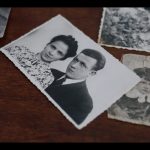
These days of lockdown have apparently been an occasion for nostalgia, for raking over the past, sifting through memories, trying to work out how then came to be now.
Like Tim Smith, the photographer who posted recently about his father’s and his own memories of taking photographs in Barbados and other islands in the Caribbean, Elzbieta Piekacz – a photographer who has documented many of our events and exhibitions – has been going over her past, recalling a moment when she travelled back to Lviv, the city that her grandparents lived in, to piece together memories, armed only with some photographs left to her by her grandmother.
The city of Lviv, the focus of this piece (and the focus of East West Street, a wonderful book by Philippe Sands), changed hands eight times between 1914 and 1944 and, in 1991, became part of the newly independent Ukraine. Lviv was for centuries one of the largest cities of Poland, and renowned as a cultural and academic centre. Until the outbreak of the Second World War, it was a multi-ethnic city in which Jews, Ukrainians, Armenians, Germans, Czechs, Russians and others coexisted with the numerically dominant Polish community.
At the start of the Second World War Lviv was annexed by the Soviet Union in 1939, when Hitler and Stalin infamously divided Poland between them. Two years later it fell again to the Germans, when the Nazis invaded the USSR – retreating Soviet forces killed most of the prison population, and the Nazis (aided by Ukrainian nationalists) murdered almost all of Lviv’s 100,000 Jewish citizens.
We have touched on the carve-up of Poland before and after the Second World War in an earlier blog post, and that division underlies much of Elzbieta’s blog here.
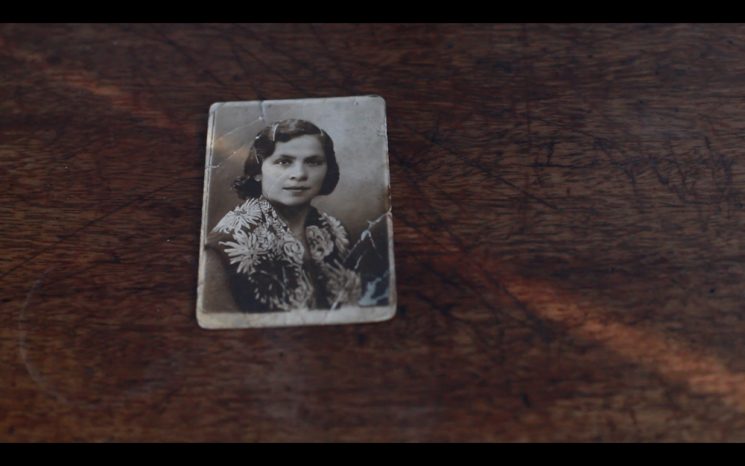
© Elzbieta Piekacz
I was raised ‘longing for a lost paradise’, for a time that is gone.
‘There is nothing like Lviv!’ Grandfather used to sing, playing the accordion – and Grandmother whispered poems about Lviv to me before I fell asleep.
Grandmother’s name was Anastasia. She said that her documents had been burned after the war, so she changed her name to Zofia. Because she was older than her husband, she also took nine years off her age.
He had been obsessed with her. She had tried to ignore him, until she saw him standing outside her house one day in heavy rain.
‘Józiu, why are you standing here, getting wet?’ she asked.
‘I am standing here and I will keep on standing here,’ he replied.
I used to ask her, ‘Grandma, how many “summers” do you have?’ and always received the same answer: ‘As many as I have winters.’ When I close my eyes, I see her rolling the dumpling dough in the kitchen, her crystal beads bouncing in pearl-like laughter, and pale pink roses, like porcelain, looking in from the wide open window. The garden was the only place that my grandparents really ‘tamed’.
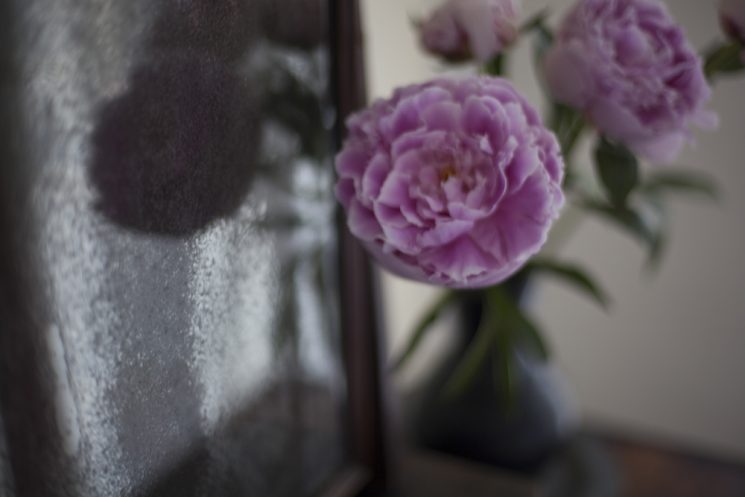
© Elzbieta Piekacz
The Red Army of the Soviet Union retook Lviv in 1944 and, following the Yalta Conference in 1945, the city became part of the Soviet Union. Zofia and Józef were among the 140,000 Poles to be resettled in territories ‘recovered’ from Germany further west of Lviv. It is estimated that Lviv lost between 80% and 90% of its pre-war population in this process.
‘Take away all the furniture from here; I will not live on someone else’s misfortune,’ said Grandfather when he was assigned a German house in Silesia. And for once Grandmother couldn’t persuade him to change his mind: they would have nothing to sleep on that night. Whenever she bought anything, she always heard the same refrain from him: ‘How will you take this to Lviv?’
Grandfather spent his whole life waiting for his Lviv to be Polish again. He returned to the city only once, just before his death in his 53th year, never fully recovered from the labour-camp in Siberia.
Grandma died 20 years later. There were no addresses for the family members who had decided to stay in Lviv, only a few photographs.
I took these with me.
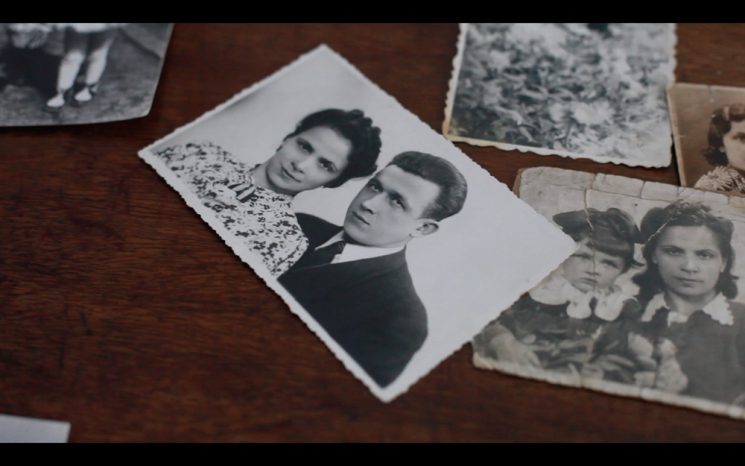
© Elzbieta Piekacz
My first day in Lviv
‘My grandfather was born in Hołosko,’ I confided in Russian to my Ukrainian co-passenger as we crossed the border in the ‘marszrutka’, the local minibus.
‘You can speak Polish,’ he said with a polite smile, flashing his golden teeth. ‘I will understand everything.’
‘He was born in Hołosko,’ I repeated.
‘Where?!’ He grimaced. ‘That’s bandit territory!’
The first days in new places always hold something special for me, maybe because I move in them more intuitively; everything is like a dance – it just happens. My first memory of Lviv is rain, blissful, cleansing. By the thick walls of the presbytery of the Latin (also called Polish) cathedral, I recall a funeral mass for Władysław Jagiełło, the Grand Duke of Lithuania and the King of Poland, which was celebrated here in 1434. The year 1656 went down in history as the year of Jan Kazimierz’s pledge, when he confessed in front of the image of Our Lady of Grace in this cathedral: ‘I choose you as my patron and queen of my countries today.’
The elderly wife of the verger is peeling carrots at the kitchen table. From behind the half-open door of the room come the words of a Polish TV soap opera. The verger is telephoning people who might know my family. I absorb the atmosphere of impatient care, filled with love, that emanates from their flat nestled in the cathedral. I bombard his wife with conversation, as she cooks. ‘What is this “Polonia”?’ she questions. (I’ve just used the term, which is a way of referring to the Polish diaspora.) I can sense her agitation. ‘There is no Polonia here,’ she says. ‘Here is Poland.’
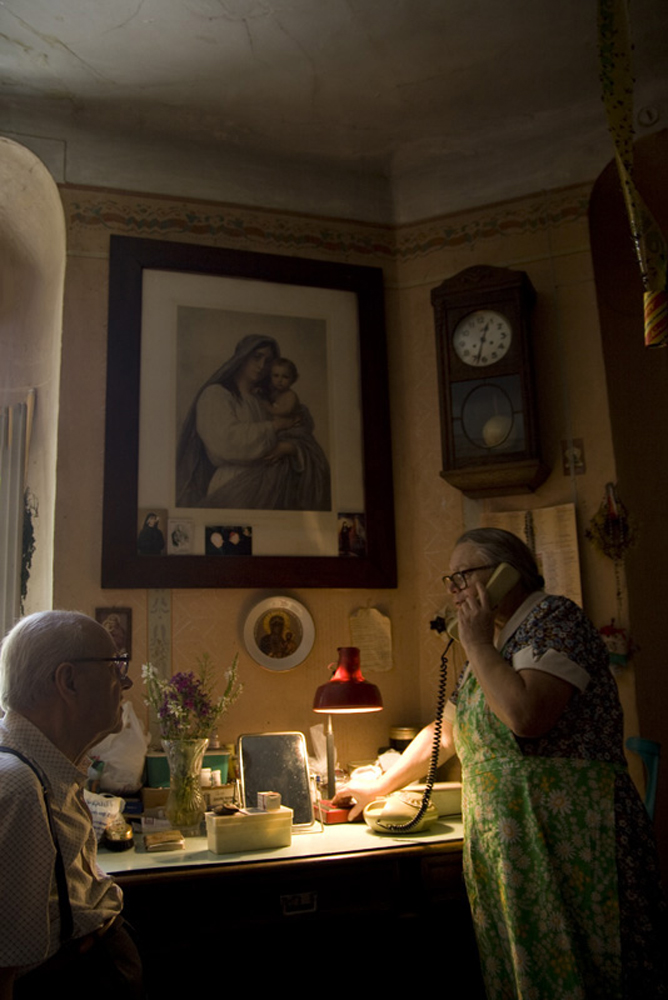
© Elzbieta Piekacz
The first walk around Lviv surprises me with the renovated facades of tenement houses, renovated only from the front, hurriedly using Unesco money for the celebration of the city’s 750th anniversary. Inside, the houses are steeped in history, layer upon layer of time, dark as in Bruno Schulz’s¹ novels, lichen-like. My two visits to the Red Cross and the Union of Poles in Lviv end in a helpless spread of arms – the faces in my photographs say nothing to those I show them to.
On the way to Hołosko, as dusk falls, I find myself in the shoemaker’s shop, where I ask for directions. The shoemaker dips the women’s heel in glue, slowly, so as not to move while I am trying to capture the moment.
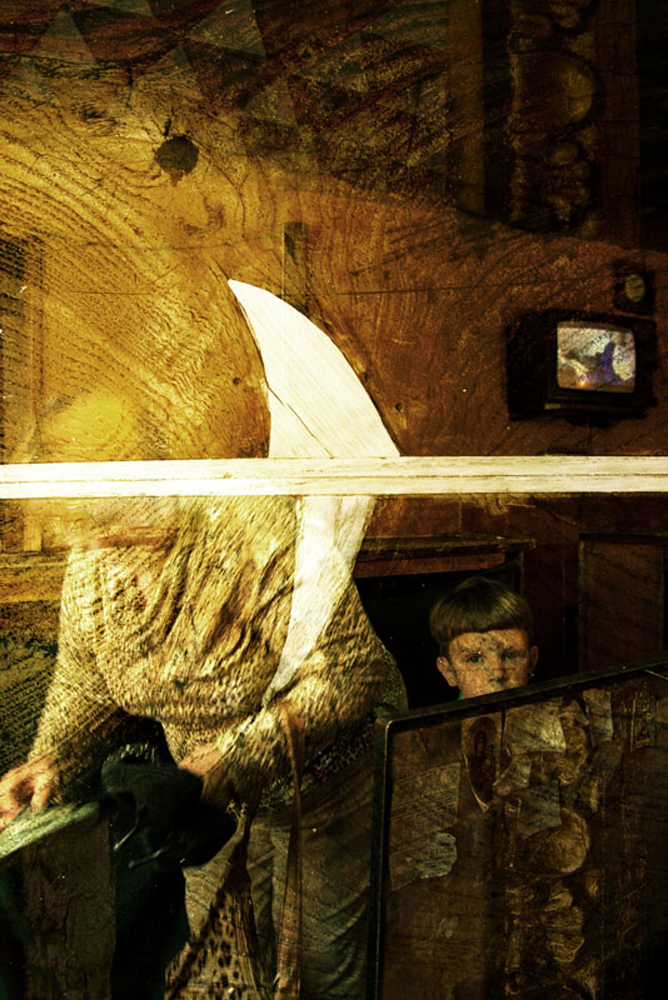
© Elzbieta Piekacz
False hope on the telephone
‘Good morning. I come from Poland; I am the granddaughter of Józef and Zofia … ’ I repeat into the handset, then – on hearing the next ‘I don’t remember … ’, ‘He/she is dead … ’, ‘Please call later … ’ – cross out the next person on the long list with the same surname in the telephone book.
And then, at last, I hear ‘Come; this is my address.’
At the market I buy my grandma’s favourite peonies and get on the tram. I travel for a long time, the old monolithic pre-war buildings of Lviv suddenly giving way to brutalist blocks of flats, sneering at me with a jagged, mocking smile. The street becomes wide, tailored to the dimensions of tanks, not people. I get out and start looking for the address.
A puppy leads me to the door of the apartment. My flowers are already wilted when an elderly woman I had previously talked to on the phone says that it wasn’t Józio but Józia, that it’s a mistake and she is sorry … I feel stupid there in the hallway with laces and emotions undone … Fortunately, the dog eases the situation, enjoying the meeting without requiring any joint connections.
Later, sitting at the bus stop, I think that it makes no sense, that it’s a waste of time looking for the past, that I will end up missing the here and now, that I should finally focus on living ‘my Lviv’.
Lisienka Street
My past began to find me when I stopped looking; that, or my work began to bear fruit.
‘Kurkowa – that will be Lisienki Street now ,’ said the old man basking in the sun, to whom I was explaining where my grandparents lived. ‘They changed the street names in Lviv four times,’ he told me.
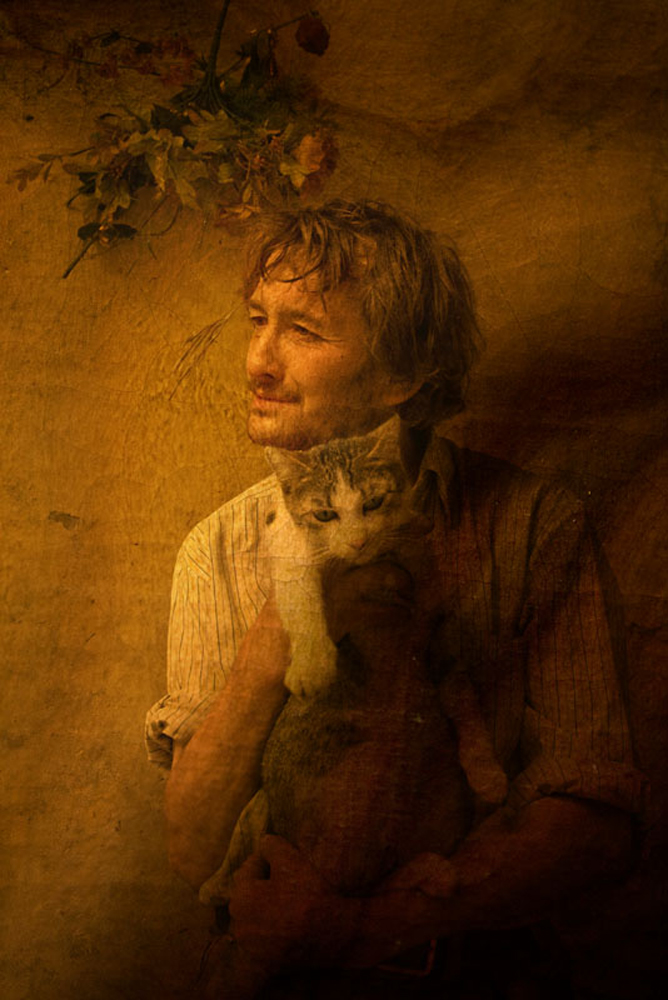
© Elzbieta Piekacz
I walked there slowly, feeling that I was crossing a different dimension, afraid that the tenements would suddenly break again into blocks. But nothing like that happened. The cobblestoned Lisienki Street descended gently from the hill, lit by afternoon light, all the way to number 3 itself. My legs teetered under me as I stepped over the threshold, remembering that that day (1 August) was the anniversary of the controversial 1944 Warsaw Uprising². ‘Choose the lesser evil,’ I said to myself, thinking about the choice my grandfather had to make when crossing this threshold back then. ‘Poland will not be here anymore,’ his brother had said to him the day before he left. ‘Tomorrow the last transport to Poland leaves in the morning – you have to decide.’
I couldn’t see the door of apartment number 2 and asked a young woman passing by about it. ‘The former owner has died; a company owns it now,’ she said. ‘I don’t know anyone, I only moved here recently, but here is the caretaker, who has been here since the very beginning, since 1945.’ The caretaker had the key to the door. In the cool office space, I recognised only the enfilade doors (doors that open between interconnected rooms, allowing the rooms to be viewed as a continuous whole) that my grandmother used to talk about – I didn’t see any objects that could have belonged to my family. Suddenly I cried, and this Ukrainian woman hugged me wordlessly. I felt she understood me. Maybe she too had not come here of her own free will; maybe like a desert plant without roots she too had been blown here by the cold winds of history.
Saint Antoni . . . let my loss be found
My past began to find me . . .
I heard the splash and saw a piece of watermelon shatter on the pavement. There was a shred of plastic bag in my hand. ‘Please take one more,’ the seller offered but I bristled at the idea of another plastic bag. ‘Fucking environmentalism,’ I thought, picking the remains of the juicy watermelon, which I had hoped to quench my thirst with, up from the pavement. ‘And why? Why am I picking it up?’ – I was furious at myself as I looked around for a basket. ‘Why can’t I just leave?’
And then my eyes stopped at the church of St Antoni and I remembered the words of a prayer to St Antoni, the patron of lost things, which my grandmother had taught me as a child:
Saint Anthony, King of Heaven
Let Your will be done
Let my loss be found.
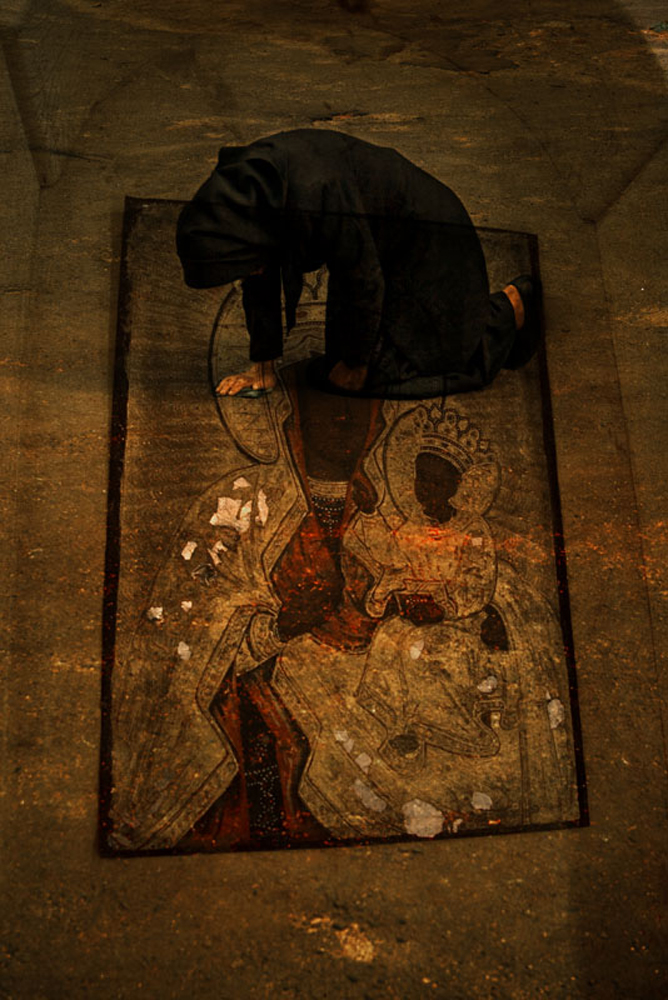
© Elzbieta Piekacz
I went inside. The mass was just being celebrated, in Polish. On the marble slab I discovered carved verses of a poem by Zbigniew Herbert³, the Polish poet who was born in Lviv:
Ocean of volatile memory
washes, crushes paintings
. In the end there will be stone
where I was born.
Every night I am standing barefoot
in front of the slammed gate
of my city.
In the sacristy, I heard that the church resumed its activity only 25 years ago and that all previous documents and parish records either had been destroyed in the Communist period or were now in Kiev or Krakow. ‘Well, all I can do now is pray to Saint Anthony,’ I said.
Shoemakers
My past began . . .
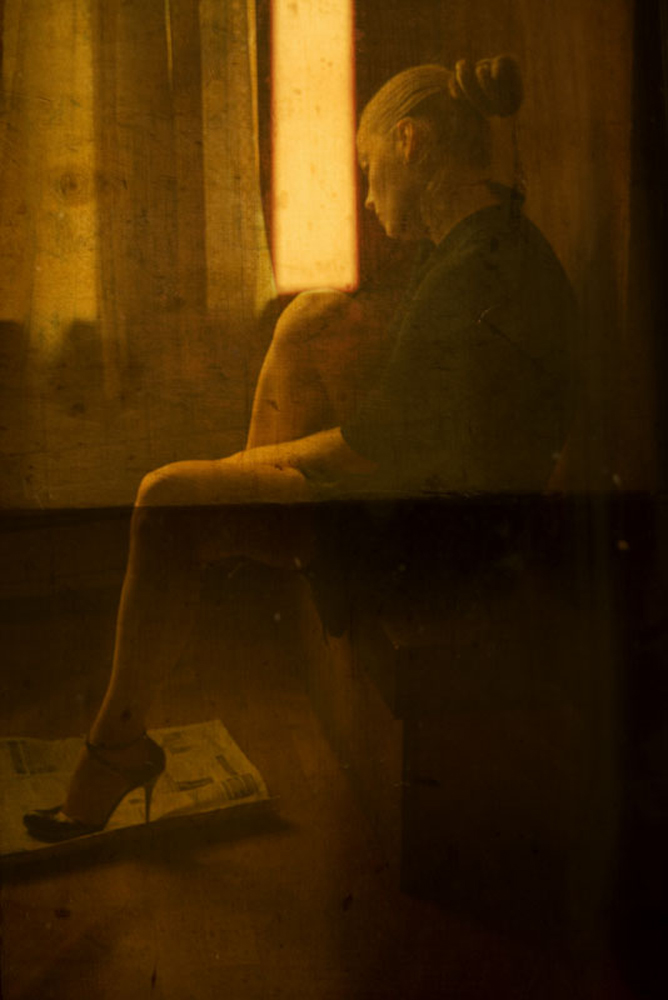
© Elzbieta Piekacz
In Lviv I became fascinated by the old shoe repair shops, after the first one I had come across on my first day on my way to Hołosko. The next one I visited, unchanged for years, in the very centre of an increasingly more modern city, delighted me with its icons of layered holy images, and with the three women customers who came and went, with the same sense of suspended expectancy as in Anton Checkhov’s Three Sisters.
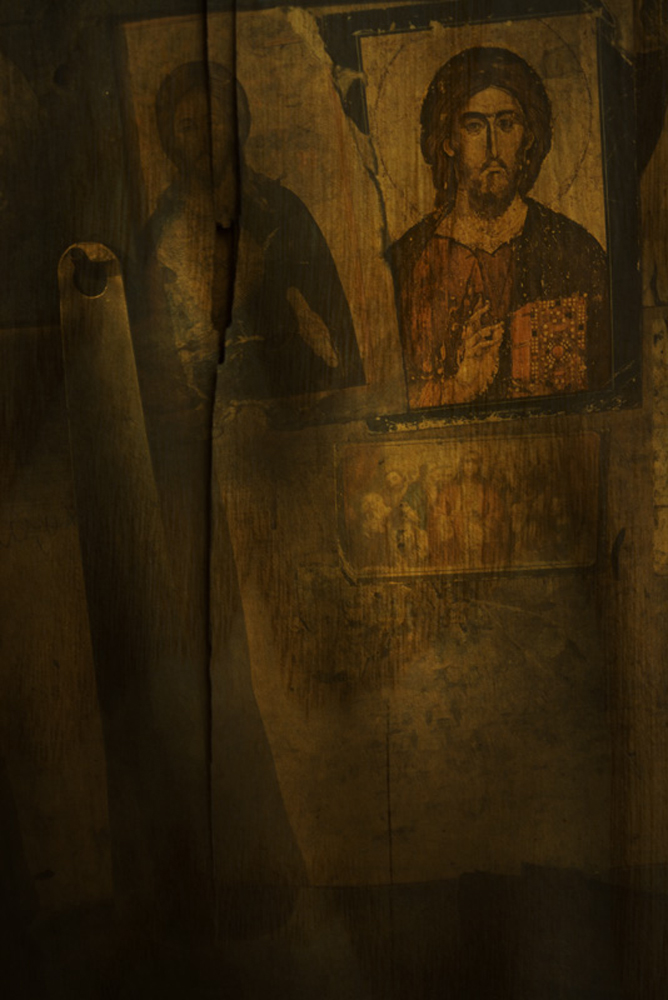
© Elzbieta Piekacz
Another shoemaker, a one-eyed old man in the spa-town of Truskawiec, 30 km away from Lviv – my grandmother’s birthplace – turned out to be all-knowing.
Little was left of the spa. The sweet-sounding Truskawiec (Strawberry City) turned out to be a desert of concrete blocks, and I had decided to see the spa and return to Lviv as soon as possible – but then I noticed the shoemaker’s shop. Old, with yellow, flaking walls and a one-eyed shoemaker inside. I felt him look at me expectantly and, as I sought to break the silence, the thought occurred to me to ask about my family.
‘What was Grandma’s maiden name?’ the shoemaker asked. I told him.
‘A Polish woman?’ he laughed. ‘That’s a Ukrainian surname.’
He put on his glasses, looked at my old sepia photograph and said ‘Well … This is Ola, this is Taras, and this is their daughter Natalia. They are my neighbours,’ he added, seeing my astonishment. A customer listening to our conversation said: ‘And I’m going there now. I can drop you off.’
A moment later, in the rattled Żiguli, similar to the black car that brings the NKVD agents who will kill the hero of Nikita Mikhalkov’s film Burnt by the Sun4, we drove to the address given, leaving the brutalist blocks of flats behind me. The man dropped me off in front of a small, crumbling cottage. Peonies bloomed in the garden; the German shepherd dog barked. A 60-year-old woman came to the gate. I didn’t need to look at the photograph: I could recognise the same person, older now by 40 years. ‘I have come from Poland … ’ I started. She looked at me for a moment, searching in her memory, until suddenly her face brightened, and in a cry of joy she shouted out the name of my mother, whom I look like:
‘Basia!’
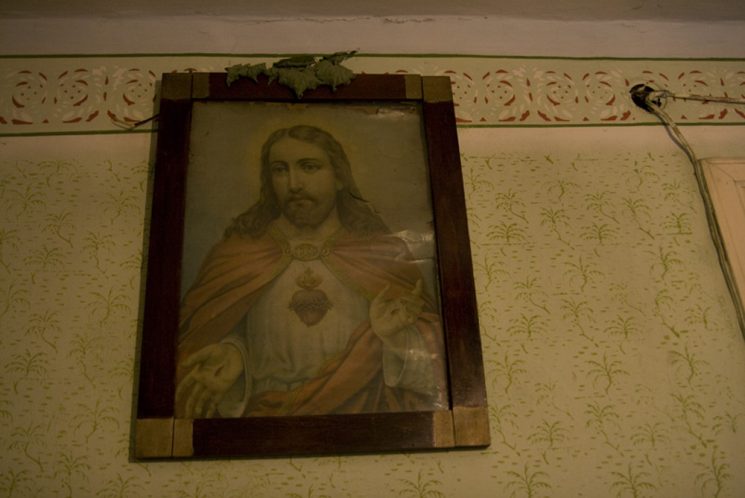
© Elzbieta Piekacz
Suchoje wine – for special occasions
‘Taras, wake up!’
A tall man with a black moustache was taking an afternoon nap on the bed. Ola winked at me knowingly.
‘This lady would like to rent a room from us for a summer holiday.’
The man, angry at being woken, blurted out, ‘Are you crazy? What summer holiday?!’
Ola was not to be discouraged. ‘But look at this lady – does she not remind you of someone?’
The man turned an angry look at me, then said a name.
‘No!’ exclaimed Ola.
Another name. ‘No.’ Another one.
‘Way off. Try again,’ she prompted.
Suddenly the man’s harsh eyes flashed and for the second time that day I heard:
‘Basia.’
Later we sit on the terrace and drink Suchoje wine, kept for special occasions.
‘I fell in love with your mother’, he confesses to me. ‘Your mother came here when she was 16.’ He lowers his voice because Ola is coming back from the kitchen with hot dumplings.
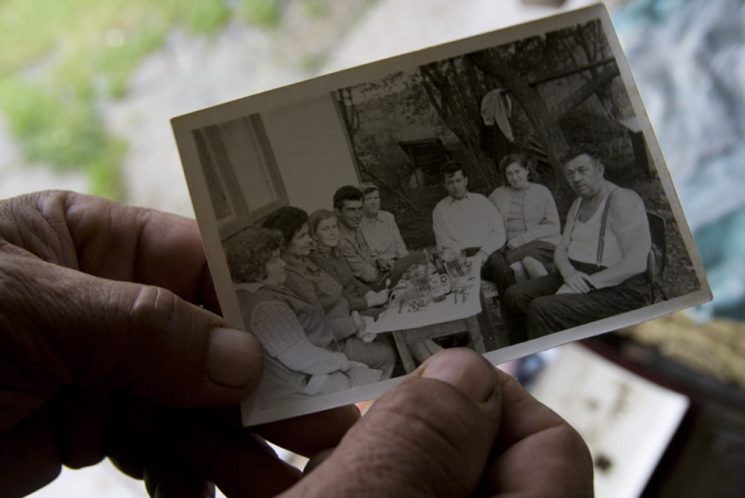
© Elzbieta Piekacz
In the evening we go to see Truskawiec’s spa, where their daughter Natalia works.
‘Everything was better then,’ sighs Ola, as we pass the stage, covered by grass, on which the orchestra once played. ‘They were like gods to us. We stood down here, while they appeared up there, on stage – so unreal, beautiful. Now it’s all rubbish.’
Rubbish and fruit trees, branches of apple trees broken from the weight of overripe fruits.
‘Once, there were houses here but they destroyed them and built blocks,’ she says. ‘I too would like to live in a flat in one of those blocks.’
‘Why?’
She is surprised at my question. ‘Do you know what winter is like here and you have to expose your bum to the wind in the outside toilet?’ She is laughing. ‘But nobody’s going to spend any money on an old wooden house like this, and we aren’t either. Natalia won’t come back here – she has a flat in the block. But for us, whatever it is, it’s enough for us.’
‘Come, eat,’ Taras invites. We listen to the news from the Polish station they always listen to. In the pauses in our conversation, I hear a familiar voice giving the shipping forecast for fishermen somewhere at sea.
‘And Natalia?’ I ask, because they don’t speak much about their daughter.
‘Natalia thinks differently,’ Taras says, gently stroking the dog. ‘She has her own mind – but I have already got wise and I know that everyone has their own mind.’
I fall asleep that night, cuddled by the sun-warmed wooden wall and going over the words that Ola said to me earlier in the evening.
I had told her that my grandmother had started to speak Ukrainian before she died. Ola’s reply was like a gift, the missing piece of a jigsaw puzzle I had been struggling to complete:
‘Your grandmother was Ukrainian. She hid it all her life from your Polish grandfather because she loved him, because she had to leave Lviv, because those were the times. The first time she came back to Ukraine, her sister said reproachfully to her, ”Did you forget your family language?” Your grandmother took her to one side and replied, weeping, with the words of a Ukrainian poem: “There must be a stone instead of a heart for those who forget their family language … ”’
¹ Bruno Schulz (1892–1942) was a Polish Jewish writer, whose novels combined modernism, surrealism and magic realism. Schulz was born in a town near Lviv – Drohobych – and was shot and killed by a Gestapo officer in 1942 while walking back home towards the Drohobycz ghetto with a loaf of bread.
² The Warsaw Uprising took place in 1944, with the German army in retreat from the Soviet Union’s Red Army. It was an attempt to liberate the Polish capital before the entry of the Red Army, in the hope that this would strengthen the international position of the Polish government in exile and prevent Poland being subsumed within the Soviet Unioin’s bloc of power.
Poorly armed insurgent troops fought on their own against the overwhelming German forces, with the Red Army choosing not to intervene. The battle lasted from 1 August 1944 to 3 October 1944, when the Polish troops surrendered. During the two-month fight, about 16 thousand Polish troops were killed or missing, 20,000 were injured and 15,000 taken prisoner. As a result of the airstrikes, shelling, desperate living conditions and massacres organised by German troops, between 150,000 and 200,000 citizens died. The fighting and systematic demolition of the city by the Germans led to the destruction of most of the left-bank buildings of Warsaw, including hundreds of priceless monuments and objects of high cultural and spiritual value.
The Warsaw Uprising is considered one of the most important events in the recent history of Poland, and one of the most controversial – there is a heated debate still about whether it was legitimate to start an action that would lead to such tragic consequences.
³ Zbigniew Herbert (29 October 1924–28 July 1998) was a Polish poet, essayist, drama writer and moralist. Herbert was a member of the Polish resistance movement, Home Army (AK), in the Second World War, and the loss of his beloved hometown (Lviv), and the subsequent feeling of being uprooted, were important motifs in his later works. He was a candidate for the 1968 Nobel Prize in Literature and was awarded, among other prizes, the PEN/Bruno Schulz Prize in 1988.
4 A 1994 film set at the time of Stalin’s Great Purge in the late 1930s, centring on the betrayal of a war hero and Bolshevik by an ex-nobleman jealous of the hero’s achievements and in love with his wife.

